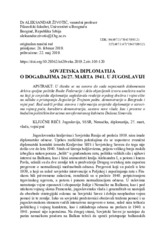Приказ основних података о документу
Sovjetska diplomatija o događajima 26/27. marta 1941. u Jugoslaviji
Soviet diplomacy on the march 26/27, 1941 events in Yugoslavia
| dc.creator | Životić, Aleksandar | |
| dc.date.accessioned | 2021-10-12T13:05:22Z | |
| dc.date.available | 2021-10-12T13:05:22Z | |
| dc.date.issued | 2019 | |
| dc.identifier.issn | 0352-3160 | |
| dc.identifier.uri | http://reff.f.bg.ac.rs/handle/123456789/2901 | |
| dc.description.abstract | Soviet diplomacy interpreted Yugoslavia's position as a result of the process that happened from its origin and place and role in the new system of international relations guided by France and Great Britain. They thought - after the fall of France, Italy's entry into the war, and the growing German pressure on the Balkans - that Yugoslavia had found itself in a kind of foreign policy isolation and was forced to sign a series of unfavorable economic agreements with Germany. According to Soviet sources, the German influence was also manifested in the political sphere by the actions of prominently politically motivated politicians and journalists, as well as "numerous German agents." They viewed the policy carried out by the previous government as a "concession" policy, and its decision to join the Tripartite Pact as the result of German pressure and the inability to provide resolute resistance to German demands. The new government was seen as a conglomeration of representatives of various political ideas, still dominated by the supporters of the new course of Yugoslav foreign policy in relation to the members of the shadow government that found themselves in the new one. Soviet diplomacy worried about the position of Croatian politicians in the new government, since the leadership of the Croatian Peasant Party stood firmly in the position of joining Yugoslavia in the Tripartite Pact. The Soviets encouraged the measures taken by the Yugoslav Government to arrest politicians and journalists, remove pro-German officers from important command positions and mobilize the military. Regarding the further development of events, Soviet diplomacy estimated that the United Kingdom would strive to exploit the uprising in Belgrade in order to form a Balkan front, which would include Yugoslavia, Greece, and possibly Turkey with British support. | en |
| dc.publisher | Institut za savremenu istoriju, Beograd | |
| dc.rights | openAccess | |
| dc.rights.uri | https://creativecommons.org/licenses/by-nc-nd/4.0/ | |
| dc.source | Istorija 20. veka | |
| dc.subject | Yugoslavia | en |
| dc.subject | USSR | en |
| dc.subject | Military Coup | en |
| dc.subject | March 27 | en |
| dc.subject | Government | en |
| dc.subject | Germany | en |
| dc.subject | Diplomacy | en |
| dc.title | Sovjetska diplomatija o događajima 26/27. marta 1941. u Jugoslaviji | sr |
| dc.title | Soviet diplomacy on the march 26/27, 1941 events in Yugoslavia | en |
| dc.type | article | |
| dc.rights.license | BY-NC-ND | |
| dc.citation.epage | 120 | |
| dc.citation.issue | 2 | |
| dc.citation.other | 37(2): 105-120 | |
| dc.citation.rank | M24 | |
| dc.citation.spage | 105 | |
| dc.citation.volume | 37 | |
| dc.identifier.doi | 10.29362/ist20veka.2019.2.ziv.105-120 | |
| dc.identifier.fulltext | http://reff.f.bg.ac.rs/bitstream/id/15950/2019_2_05_ziv_105-120.pdf | |
| dc.identifier.scopus | 2-s2.0-85078074677 | |
| dc.type.version | publishedVersion |

